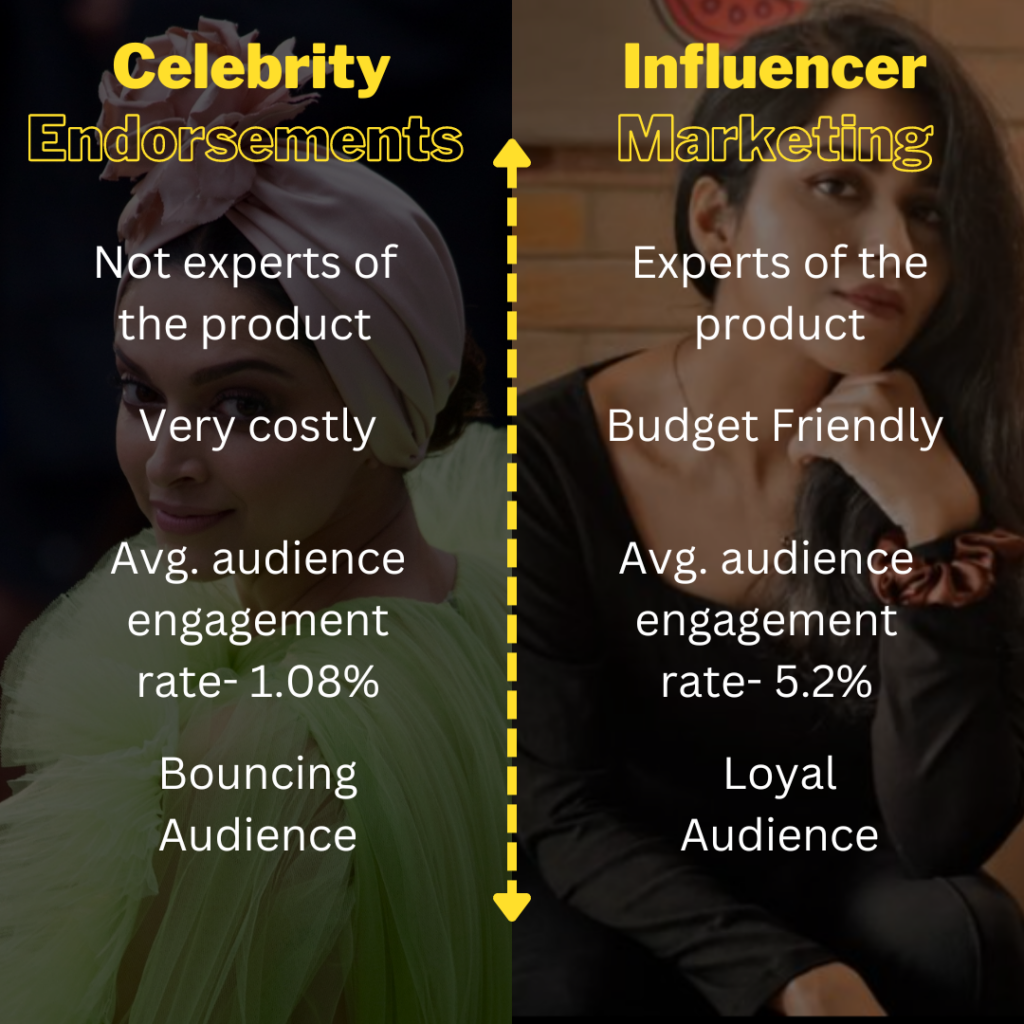Influencer Marketing: Impacting consumers
Written by: Sohom Mukherjee
Influencer marketing can influence a consumer’s behavior by building trust and credibility in a brand through the endorsement of a well-known person who has an extensive follower base on social media. The personal experiences, user reviews, and testimonials shared by these influencers can instill faith in the customer’s minds and help them make an informed decision about their purchase of a product or service. This strategy is similar to an age-old word-of-mouth marketing strategy that has evolved into experience sharing, user-generated content, shared via blogs and social media. Genuine and honest insight into products and services manipulates a consumer’s trust and loyalty to a company.
What is Influencer Marketing?
Influencer marketing is a type of social marketing in which brands collaborate with people who have a large loyal follower base on social media platforms. These influencers use their platforms to promote the brand and its products or services to their followers, who on the other hand are more likely to trust their recommendations than the brand content itself. Influencer marketing aims to raise brand awareness and drive sales.

Types of Influencers
There are several types of influencers depending on the number of followers and their respective engagement rates. Let’s see what they are.
Nano-influencer
Nano-influencers are collaborators who have a follower base between 100 and 10,000. Even though the follower base is smaller, their engagement is an average of 5%. They have a stronger relationship with their audience and thus the conversion rate may be more.
Micro-influencers
Micro-influencers are the ones who have followers between 10,000 and 50,000. Their engagement is much larger than that of macro with a rate of 1.82%.
Macro-influencers
This entails collaborating with individuals who have a large following, to be specific, creators having more than 1 million followers, who are called macro influencers. Their reach and impressions are really high. However, their engagement is not more than 0.72%. Celebrities are vivid examples of macro influencers.

Employee influencers
This type of marketing can be a part of in-house marketing. It utilizes current employees or brand ambassadors to promote the company, benefits, work-life balance, and company activities on their personal accounts. It helps in increasing the good name of an organization or a company.
Consumer Behavior in Marketing
In marketing, consumer behavior refers to the decision made by an individual or a brand’s consumer in virtue of buying a product or using a service from the company. Analyzing consumer behavior helps the marketer to understand what they feel about the brand’s products, what influences them to buy the product, their behavioral pattern when they are shopping or researching, and eventually their purchasing decision.
Understanding consumer behavior also helps a marketer to decide the product placement, and how to present their marketing messages so that the impact on the customers is maximum.
There are some factors that influence positive consumer behavior and they are as follows:
- Psychological Factors: their perception and attitude towards the brand. For example, many people deleted their Twitter accounts after Elon Musk bought out the company because they did not like how the new owner ran the company.
- Personal Factors: Consumer behavior is highly influenced by demographics ( age, gender, culture. etc).
- Social Factors: Purchasing designs are also highly influenced by friends, family, education, income, and social status.

Bridging Consumerism and Influencer marketing
As I mentioned earlier, word-of-mouth works a lot better than a brand’s content. When social media influencers share their personal experience about a product and service that they have personally used with their loyal customer base, the followers are inclined towards listening to the person who they trust and believe.
For example, there is an amazing food blogger and influencer whom I religiously follow on Instagram called kolkatadelites, and try out the restaurants marketed by him. His way of content creation and his expertise in pocket-friendly restaurants really aligns with me. So in essence, the way he influences the restaurants, helps me decide whether I should visit and try out the food.
Let’s check out some global influencer marketing statistics.
Influencer Marketing: Trusted by Millions
As per the Digital Marketing Institute, here is a list of statistics and figures that demonstrate how millions of consumers now trust influencers. Marketers, on the other hand, are gaining a better understanding of this fast.
- As per research findings, 48% of influencer campaigns were carried out to use influencers on TikTok.
- Around 70% of Teenagers trust influencers more than conventional celebrities.
- Approximately 86% of women use social media for buying advice.
- 49% of the consumer believe influencers
- TikTok has developed a $1 billion fund to support influencers
- Influencer marketing campaigns and programs earn roughly $5.9 for every dollar expended
- Roughly 57% of fashion and beauty marketing campaigns involve influencer marketing
- The influencer marketing industry is projected to increase from $1.7 Billion industry to $22.3 billion industry 2024
- Reports suggest that around 82% of people have full trust in social networks to guide them properly and help them arrive at their purchasing decisions.
- 42% of consumers use ad-blocking software.
- Following a creator on Twitter results in a 61% increase in brand likeability and a 64% increase in recommendation intention.
- With approximately 2.89 billion monthly users, Facebook is considered the most influential social media platform, influencing 52% of purchasing decisions.

Influencer Marketing factors impacting consumers
Consider peer recommendations
According to Joey Little, 92% of consumers trust their peer recommendations while purchasing something. This is because as humans, we trust our friends, family, or relatives much more than a brand. When a product is well recognized by an individual who has a loyal follower base along with having a strong bond with them and is essentially appreciated in a specific group, its demand improves. The promise provided by the influencer is always more than any branded content.

Influencers as opinion experts
The idea of influencer marketing is nothing new. Marketers have been using the strategy for a long time. More famously, it was known as celebrity endorsements. However, the common notion amongst consumers nowadays is that the celebrity would not be using the product that they endorse personally. On the other hand, the influencer will actually use the product themselves before giving a personal review on it. That is the reason why an influencer can be described as an expert on the product and his/her followers will be inclined towards buying the products influenced by them.

Content Landscape
With an increase in the number of influencers, the overall variety of marketing content has considerably increased. These various type of content attracts the attention of a wide range of audiences who are inspired by them and encouraged to follow and buy the products.
Even if they do not immediately purchase, they become aware of the brand, and its products/services.
In conclusion, it can be effectively stated that influencer marketing has an extensive impact on consumer behavior by virtue of purchasing decisions. An influencer marketing campaign can help a brand build trust and credibility, as well as reach a highly targeted audience. This type of social messaging can also build a sense of community, by which people are more likely to buy after seeing others do the same. When a product is promoted by an influencer, their followers are more likely to purchase it. This can lead to increased brand loyalty and customer retention
Leave a comment below to let us know what you think. Contact us to know more about our service and how we can help your brand get a social boost.



Pingback: 6 Best Digital Marketing Strategies | 2023 Trends – Marv | Digital Marketing Specialist